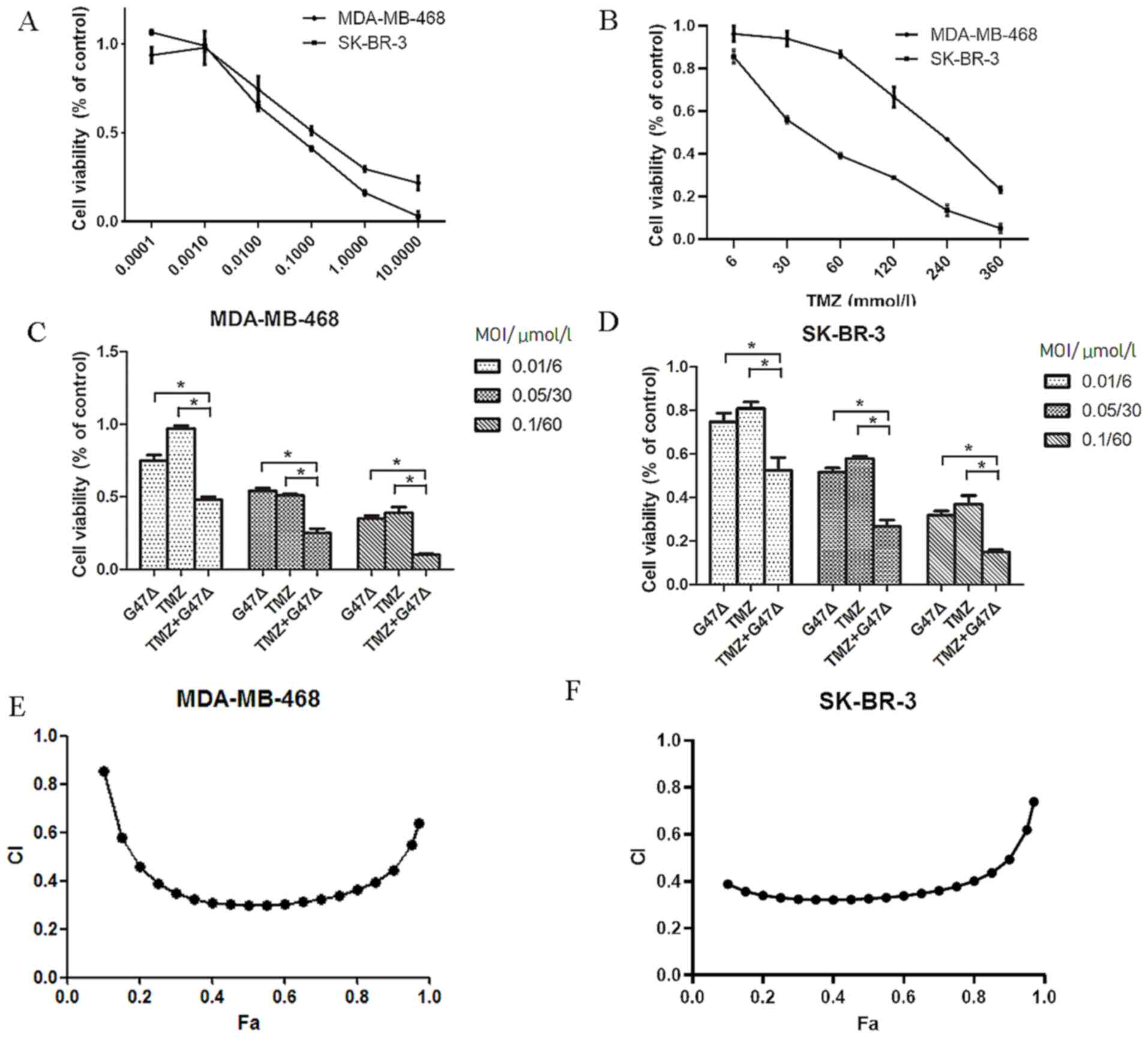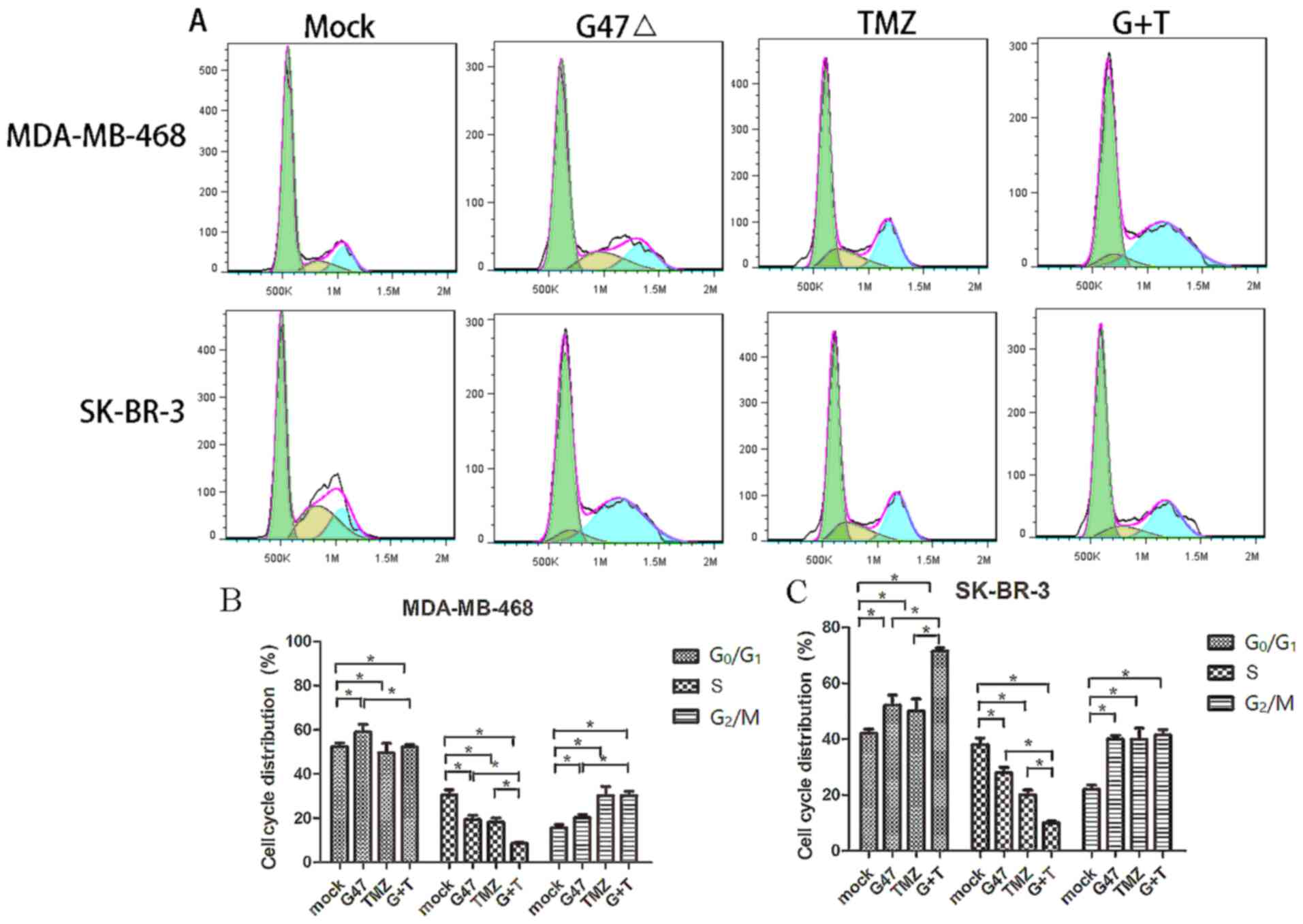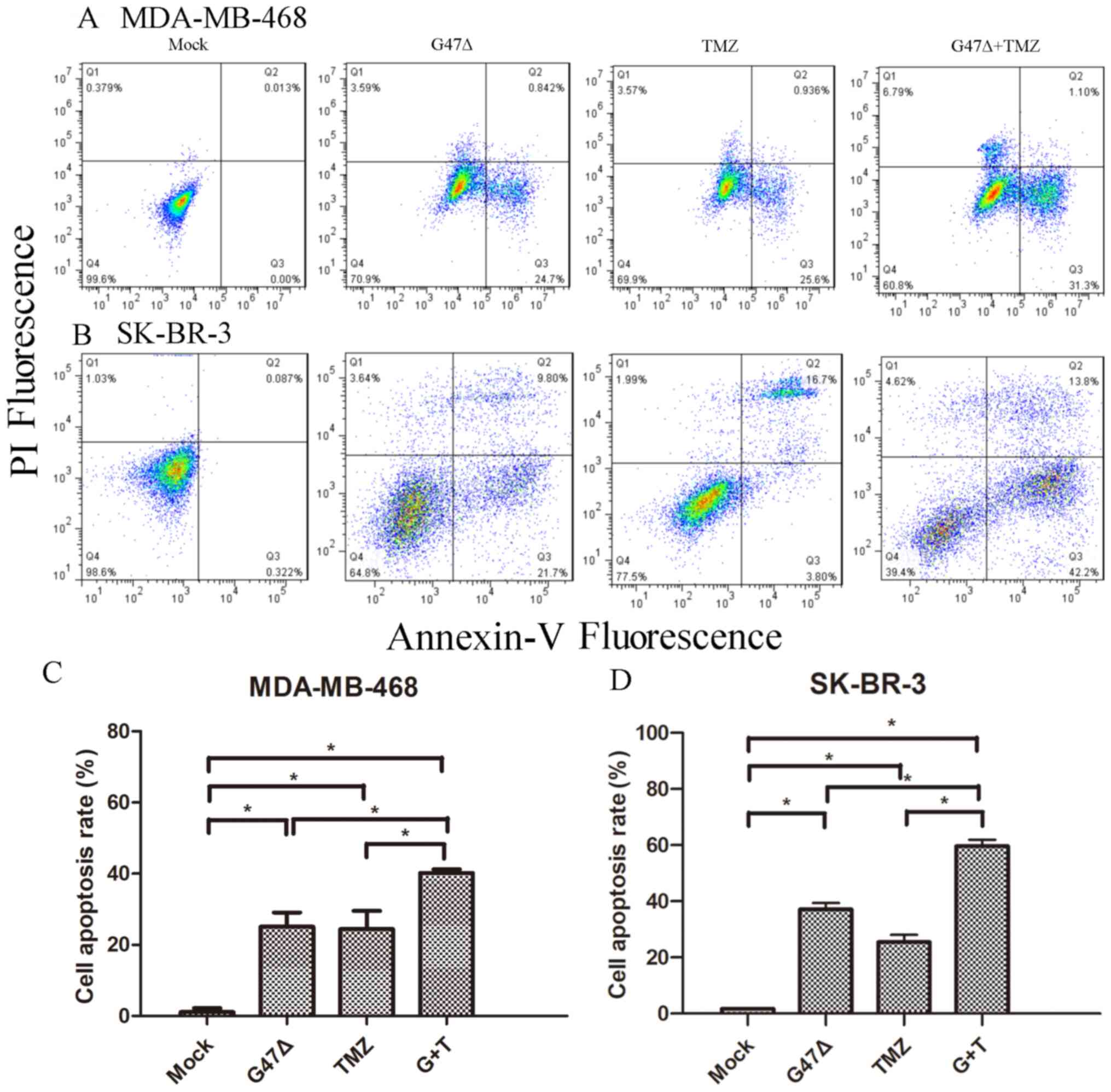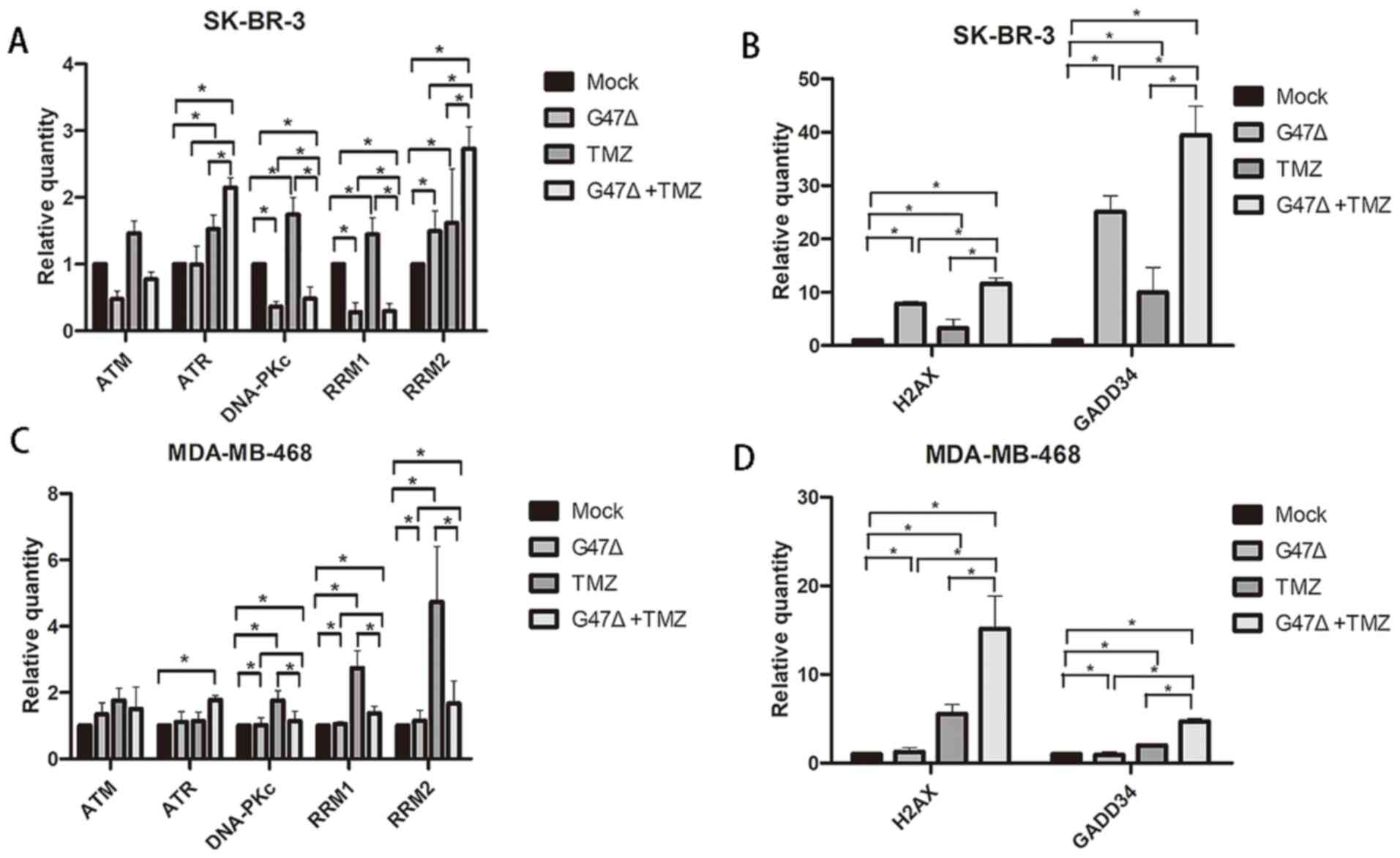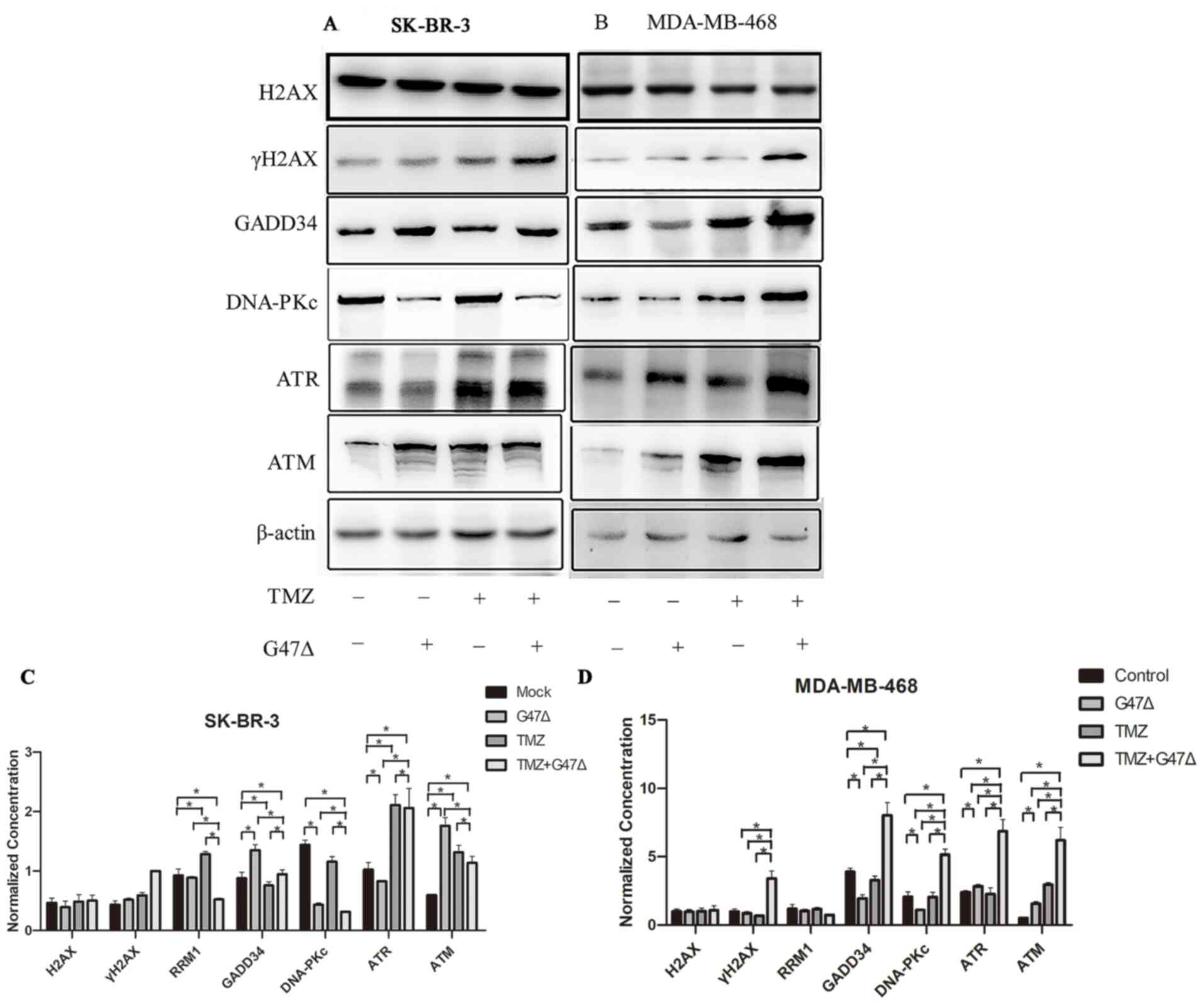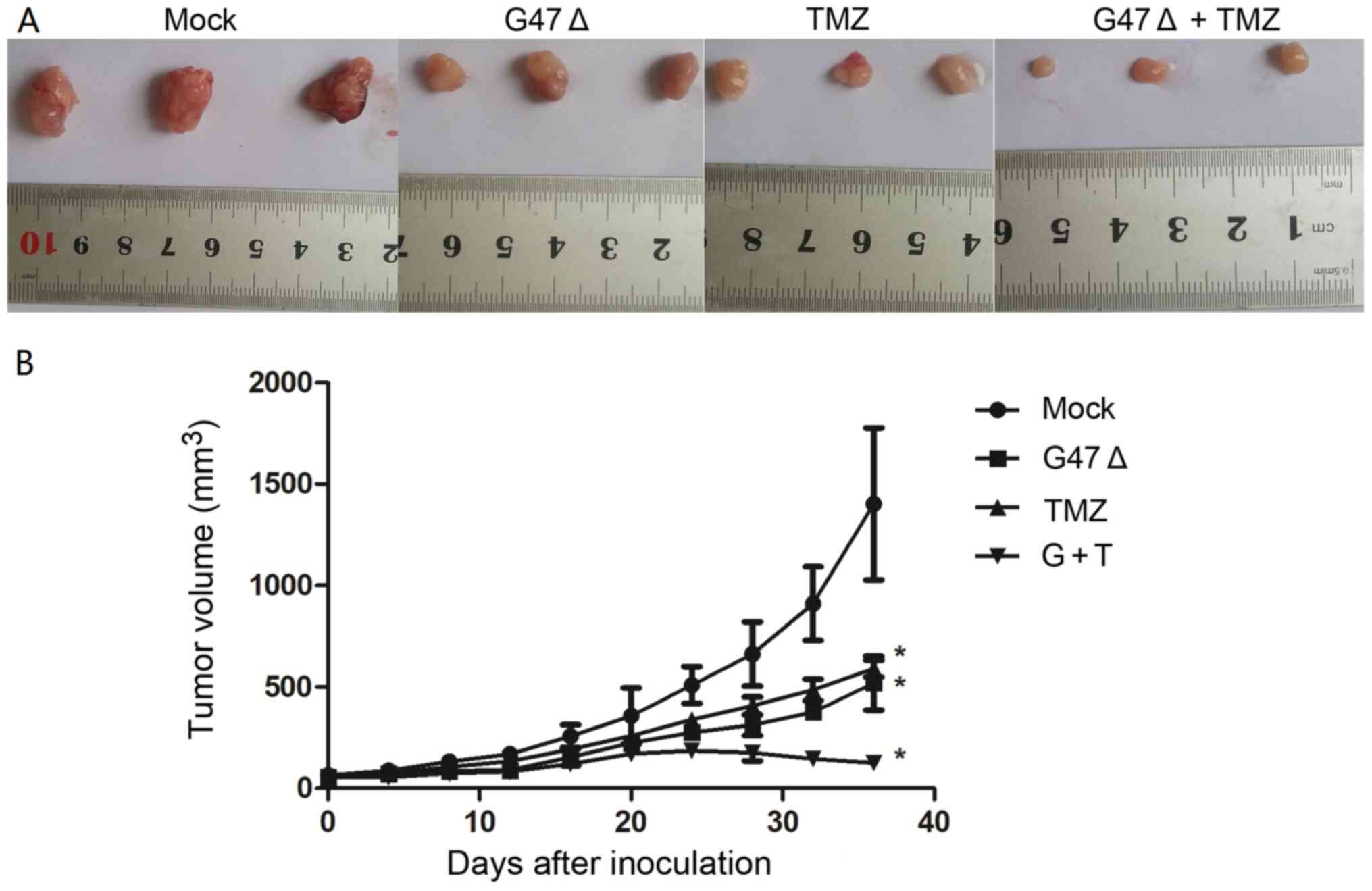|
1
|
Shah R, Rosso K and Nathanson SD:
Pathogenesis, prevention, diagnosis and treatment of breast cancer.
World J Clin Oncol. 5:283–298. 2014. View Article : Google Scholar : PubMed/NCBI
|
|
2
|
Tinoco G, Warsch S, Gluck S, Avancha K and
Montero AJ: Treating breast cancer in the 21st century: Emerging
biological therapies. J Cancer. 4:117–132. 2013. View Article : Google Scholar : PubMed/NCBI
|
|
3
|
Lou E: Oncolytic herpes viruses as a
potential mechanism for cancer therapy. Acta Oncol. 42:660–671.
2003. View Article : Google Scholar : PubMed/NCBI
|
|
4
|
Chiocca EA and Rabkin SD: Oncolytic
viruses and their application to cancer immunotherapy. Cancer
Immunol Res. 2:295–300. 2014. View Article : Google Scholar : PubMed/NCBI
|
|
5
|
Burke J, Nieva J, Borad MJ and Breitbach
CJ: Oncolytic viruses: Perspectives on clinical development. Curr
Opin Virol. 13:55–60. 2015. View Article : Google Scholar : PubMed/NCBI
|
|
6
|
Rehman H, Silk AW, Kane MP and Kaufman HL:
Into the clinic: Talimogene laherparepvec (T-VEC), a first-in-class
intratumoral oncolytic viral therapy. J Immunother Cancer.
4:532016. View Article : Google Scholar : PubMed/NCBI
|
|
7
|
Fukuhara H, Ino Y and Todo T: Oncolytic
virus therapy: A new era of cancer treatment at dawn. Cancer Sci.
107:1373–1379. 2016. View Article : Google Scholar : PubMed/NCBI
|
|
8
|
Mannas JP, Lightner DD, Defrates SR,
Pittman T and Villano JL: Long-term treatment with temozolomide in
malignant glioma. J Clin Neurosci. 21:121–123. 2014. View Article : Google Scholar : PubMed/NCBI
|
|
9
|
Sengupta S, Marrinan J, Frishman C and
Sampath P: Impact of temozolomide on immune response during
malignant glioma chemotherapy. Clin Dev Immunol. 2012:8310902012.
View Article : Google Scholar : PubMed/NCBI
|
|
10
|
Bafaloukos D, Tsoutsos D, Kalofonos H,
Chalkidou S, Panagiotou P, Linardou E, Briassoulis E, Efstathiou E,
Polyzos A, Fountzilas G, et al: Temozolomide and cisplatin versus
temozolomide in patients with advanced melanoma: A randomized phase
II study of the hellenic cooperative oncology group. Ann Oncol.
16:950–957. 2005. View Article : Google Scholar : PubMed/NCBI
|
|
11
|
Dronca RS, Allred JB, Perez DG, Nevala WK,
Lieser EA, Thompson M, Maples WJ, Creagan ET, Pockaj BA, Kaur JS,
et al: Phase II study of temozolomide (TMZ) and everolimus (RAD001)
therapy for metastatic melanoma: A north central cancer treatment
group study, N0675. Am J Clin Oncol. 37:369–376. 2014. View Article : Google Scholar : PubMed/NCBI
|
|
12
|
Zhang J, Stevens MF and Bradshaw TD:
Temozolomide: Mechanisms of action, repair and resistance. Curr Mol
Pharmacol. 5:102–114. 2012. View Article : Google Scholar : PubMed/NCBI
|
|
13
|
Kondo N, Takahashi A, Mori E, Noda T,
Zdzienicka MZ, Thompson LH, Helleday T, Suzuki M, Kinashi Y,
Masunaga S, et al: FANCD1/BRCA2 plays predominant role in the
repair of DNA damage induced by ACNU or TMZ. PLoS One.
6:e196592011. View Article : Google Scholar : PubMed/NCBI
|
|
14
|
Fu X, Tao L, Wang PY, Cripe TP and Zhang
X: Comparison of infectivity and spread between HSV-1 and HSV-2
based oncolytic viruses on tumor cells with different receptor
expression profiles. Oncotarget. 9:21348–21358. 2018. View Article : Google Scholar : PubMed/NCBI
|
|
15
|
Baer A and Kehn-Hall K: Viral
concentration determination through plaque assays: Using
traditional and novel overlay systems. J Vis Exp.
e520652014.PubMed/NCBI
|
|
16
|
Han C and Yang C: Viral plaque analysis on
a wide field-of-view, time-lapse, on-chip imaging platform.
Analyst. 139:3727–3734. 2014. View Article : Google Scholar : PubMed/NCBI
|
|
17
|
Chou TC: The median-effect principle and
the combination index for quantitation of synergism and antagonism.
Chou TC and Rideout DC: Synergism and antagonism in chemotherapy.
Academic Press; San Diego: pp. 61–102. 1991
|
|
18
|
Khafif A, Schantz SP, Chou TC, Edelstein D
and Sacks PG: Quantitation of chemopreventive synergism between
(−)-epigallocatechin-3-gallate and curcumin in normal, premalignant
and malignant human oral epithelial cells. Carcinogenesis.
19:419–424. 1998. View Article : Google Scholar : PubMed/NCBI
|
|
19
|
Livak KJ and Schmittgen TD: Analysis of
relative gene expression data using real-time quantitative PCR and
the 2(-Delta Delta C(T)) method. Methods. 25:402–408. 2001.
View Article : Google Scholar : PubMed/NCBI
|
|
20
|
Vallin J and Grantham J: The role of the
molecular chaperone CCT in protein folding and mediation of
cytoskeleton-associated processes: Implications for cancer cell
biology. Cell Stress Chaperones. 24:17–27. 2019. View Article : Google Scholar : PubMed/NCBI
|
|
21
|
Morata G and Ballesteros-Arias L: Cell
competition, apoptosis and tumour development. Int J Dev Biol.
59:79–86. 2015. View Article : Google Scholar : PubMed/NCBI
|
|
22
|
Roos WP and Kaina B: DNA damage-induced
cell death by apoptosis. Trends Mol Med. 12:440–450. 2006.
View Article : Google Scholar : PubMed/NCBI
|
|
23
|
Mah LJ, El-Osta A and Karagiannis TC:
gammaH2AX: A sensitive molecular marker of DNA damage and repair.
Leukemia. 24:679–686. 2010. View Article : Google Scholar : PubMed/NCBI
|
|
24
|
Thomas SE, Malzer E, Ordóñez A, Dalton LE,
van't Wout EF, Liniker E, Crowther DC, Lomas DA and Marciniak SJ:
p53 and translation attenuation regulate distinct cell cycle
checkpoints during endoplasmic reticulum (ER) stress. J Biol Chem.
288:7606–7617. 2013. View Article : Google Scholar : PubMed/NCBI
|
|
25
|
Watanabe D: Medical application of herpes
simplex virus. J Dermatol Sci. 57:75–82. 2010. View Article : Google Scholar : PubMed/NCBI
|
|
26
|
Aghi M, Rabkin S and Martuza RL: Effect of
chemotherapy-induced DNA repair on oncolytic herpes simplex viral
replication. J Natl Cancer Inst. 98:38–50. 2006. View Article : Google Scholar : PubMed/NCBI
|
|
27
|
Jahan N, Lee JM, Shah K and Wakimoto H:
Therapeutic targeting of chemoresistant and recurrent glioblastoma
stem cells with a proapoptotic variant of oncolytic herpes simplex
virus. Int J Cancer. 141:1671–1681. 2017. View Article : Google Scholar : PubMed/NCBI
|
|
28
|
Norbury CJ and Zhivotovsky B: DNA
damage-induced apoptosis. Oncogene. 23:2797–2808. 2004. View Article : Google Scholar : PubMed/NCBI
|
|
29
|
Borges HL, Linden R and Wang JY: DNA
damage-induced cell death: Lessons from the central nervous system.
Cell Res. 18:17–26. 2008. View Article : Google Scholar : PubMed/NCBI
|
|
30
|
Prestwich RJ, Errington F, Diaz RM, Pandha
HS, Harrington KJ, Melcher AA and Vile RG: The case of oncolytic
viruses versus the immune system: Waiting on the judgment of
Solomon. Hum Gene Ther. 20:1119–1132. 2009. View Article : Google Scholar : PubMed/NCBI
|
|
31
|
Holliday DL and Speirs V: Choosing the
right cell line for breast cancer research. Breast Cancer Res.
13:2152011. View Article : Google Scholar : PubMed/NCBI
|
|
32
|
Melisko ME, Assefa M, Hwang J, DeLuca A,
Park JW and Rugo HS: Phase II study of irinotecan and temozolomide
in breast cancer patients with progressing central nervous system
disease. Breast Cancer Res Treat. 177:401–408. 2019. View Article : Google Scholar : PubMed/NCBI
|
|
33
|
Bobustuc GC, Kassam AB, Rovin RA, Jeudy S,
Smith JS, Isley B, Singh M, Paranjpe A, Srivenugopal KS and Konduri
SD: MGMT inhibition in ER positive breast cancer leads to CDC2,
TOP2A, AURKB, CDC20, KIF20A, Cyclin A2, Cyclin B2, Cyclin D1, ERα
and Survivin inhibition and enhances response to temozolomide.
Oncotarget. 9:29727–29742. 2018. View Article : Google Scholar : PubMed/NCBI
|
|
34
|
Garza-Morales R, Gonzalez-Ramos R, Chiba
A, Montes de Oca-Luna R, McNally LR, McMasters KM and
Gomez-Gutierrez JG: Temozolomide enhances triple-negative breast
cancer virotherapy in vitro. Cancers (Basel). 10:1442018.
View Article : Google Scholar
|















